Applied AI Lunch Talk
The EU AI Act should go into force later this
year. Are you and your team ready for that? This
talk will provide an accessible and practical
introduction to the EU AI Act. Furthermore, we'll
discuss exactly what AI practitioners of all types,
whether researchers, startups/SMEs, or scaled
corporations, should begin to prioritize and put
into practice today in order to ready themselves
for the Act, and other AI regulations like it.
Bio: Bill Marino
PhD student in the department of Computer
Science and Technology at Cambridge University.

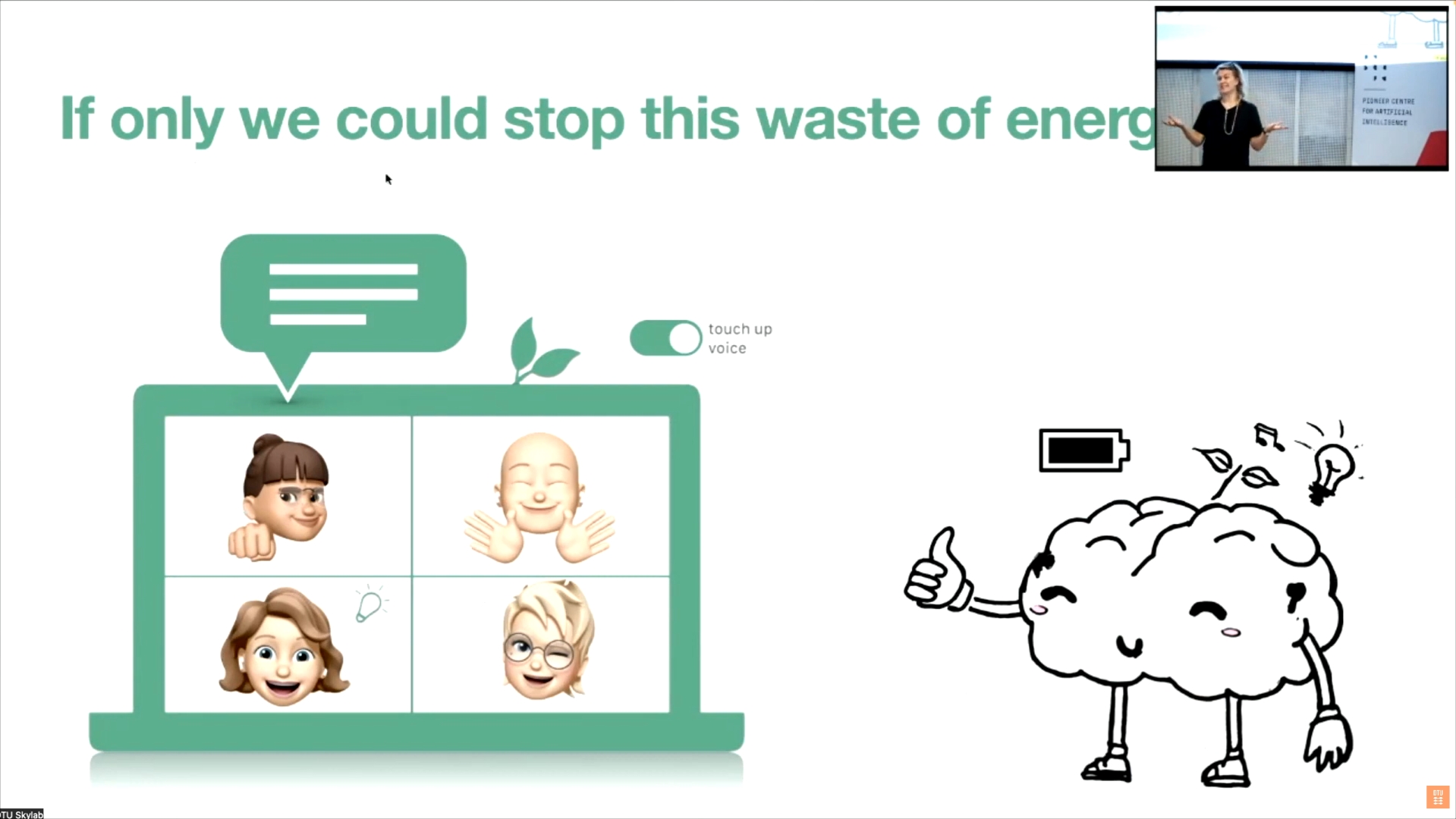
When humans interact socially via speech, our brains do an extraordinary job converting pressure waves into neural encodings of phonemes, words, sentences and concepts that we can make sense of, reflect on, and respond to. Some times, the challenge is too hard, like if you are in a noisy party and head for the dance floor because it just feels too tiring to have a conversation.
Augmented hearing is setting out to bring the ideal sound scene to you at all times. Just like when your smartphone camera enables you to take beautiful photos by blurring the background, making the subject even more clear and vivid. This is enabled via AI. For good reasons, AI tools are rarely applied to your audio scenes. Bridging AI with neuro science and audio insights, we envision a future where people can have clear and fluent conversations without being unnecessarily drained from poor audio conditions.
Graduated from DTU as M.Sc. Biomedical Engineering in 2017. Specialised in ML, DSP and Auditory Signal processing, generally focused on signals from and functional images of the brain. Worked with Digital Transformation for McKinsey & Co, and subsequently with developing audiological algorithms for hearing aids at Demant. Genuinely passionate about bringing technology to improve people’s lives.
by FOSS
At FOSS our mission is to provide data and insights to help the food industry make optimal use of raw materials and reduce food waste. In this presentation we will share insight on the journey we are on to apply data science and machine learning to address some of the big challenges the world is facing. It is a journey full of possibilities, but also a journey which emphasizes a range of practical challenges that needs to be addressed to apply data science to support a truly data driven food production system.
He has a background in physics and computer science and holds a Ph.D. from the Technical University of Denmark. He has been working for FOSS during two periods initially from 2011 developing technology for X-ray and spectroscopy instruments. After a few years in a start-up, he now manages a team of specialist developing our spectroscopic, x-ray, and vision technologies and their integration in FOSS’ products. Lately, with a strong focus on vision and AI.
Thomas holds a Ph.D in Optical Science from DTU. Since then he has worked with innovation in industry and various startups with focus on how to apply new technology to address key problems associated with sustainable food production. He has been with FOSS since 2020 heading a cross discipline innovation team responsible for scoping the development of the company's future solution.
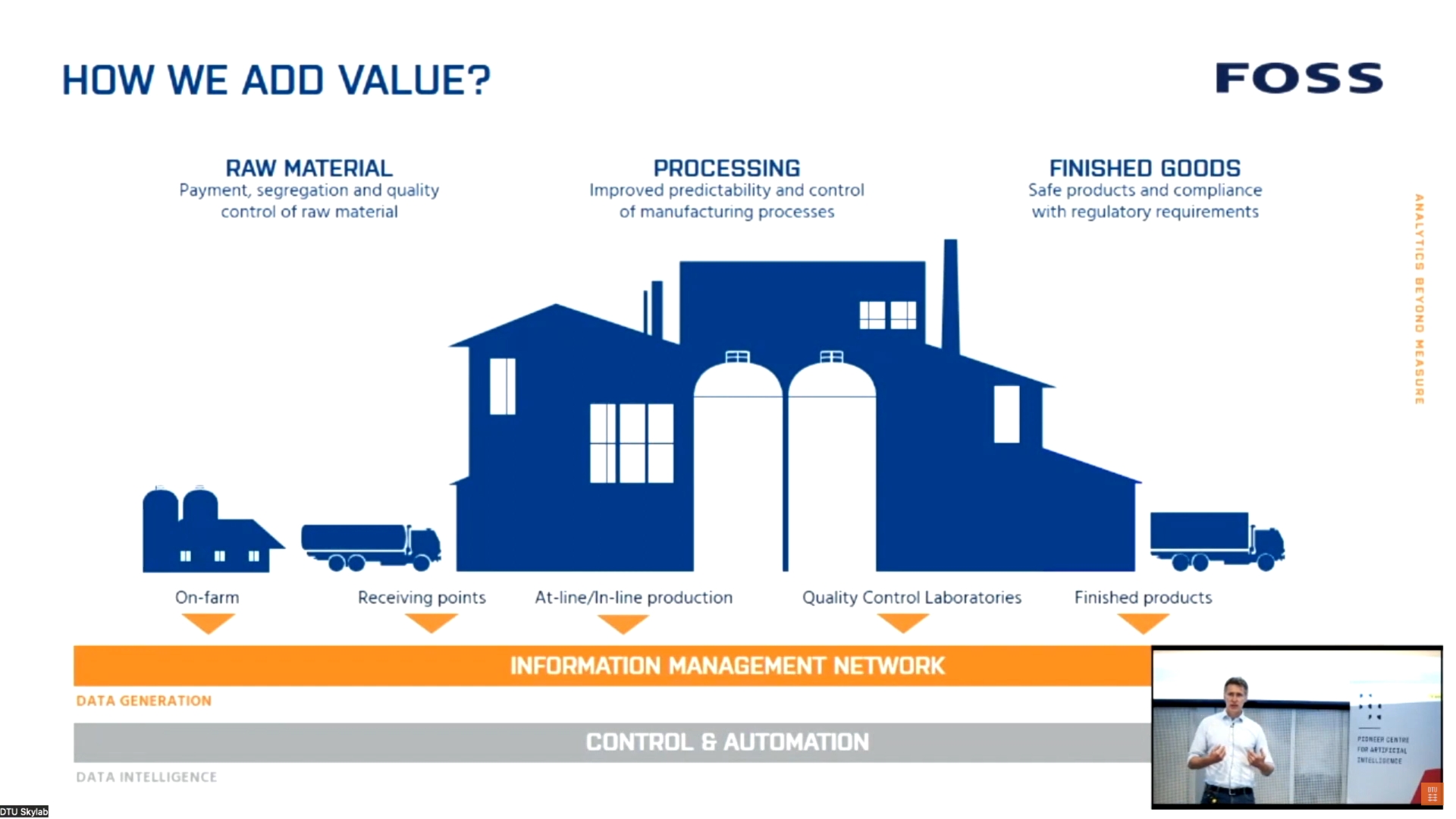
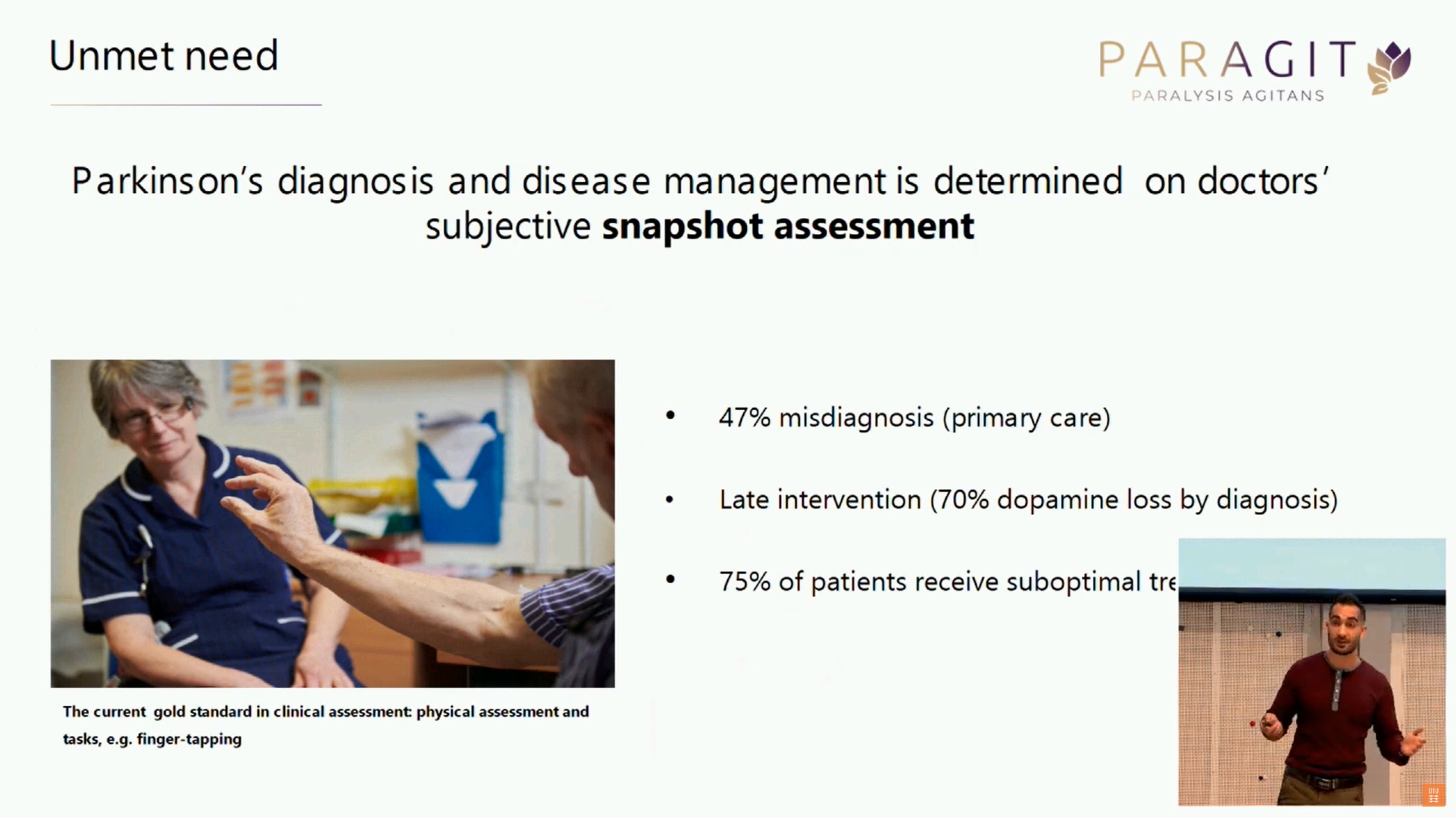
Parkinson’s is the second largest neurodegenerative disorder and is the fastest growing one. The current golden standard for diagnosing movement-related disorders like Parkinson’s is unfortunately still based on a completely subjective standard scale. This leads to several major consequences for the overall society and especially in the long term with a 47% misdiagnose rate in primary care and often results in a very late diagnosis. We at Paragit Solutions combine the latest hardware wearable technology with applied deep learning to analyze and cluster potential upcoming patients based on their abnormal muscle fluctuations during the day.
He is the founder, and CEO of Paragit Solutions and is leading the overall product development. Filfil received a master’s degree in electronic engineering from DTU in 2019 and San Jose State University -Silicon Valley. He is the inventor of two patents used in Paragit’s hardware sleeve. Previously co-founded 3 other startups within deep tech and hard tech and have mostly been the lead developer of hardware products.
by BrainCapture
80% of people with epilepsy live in low- and middle-income countries where EEG services are hard to access. BrainCaptures aims to bridge the epilepsy treatment gap through an AI enabled, low cost diagnostic solution. This presentation provides an insight into BrainCaptures' solution.
He is the CEO of BrainCapture. He holds a PhD in machine learning and has been applying AI to real world problems for more than 15 years.
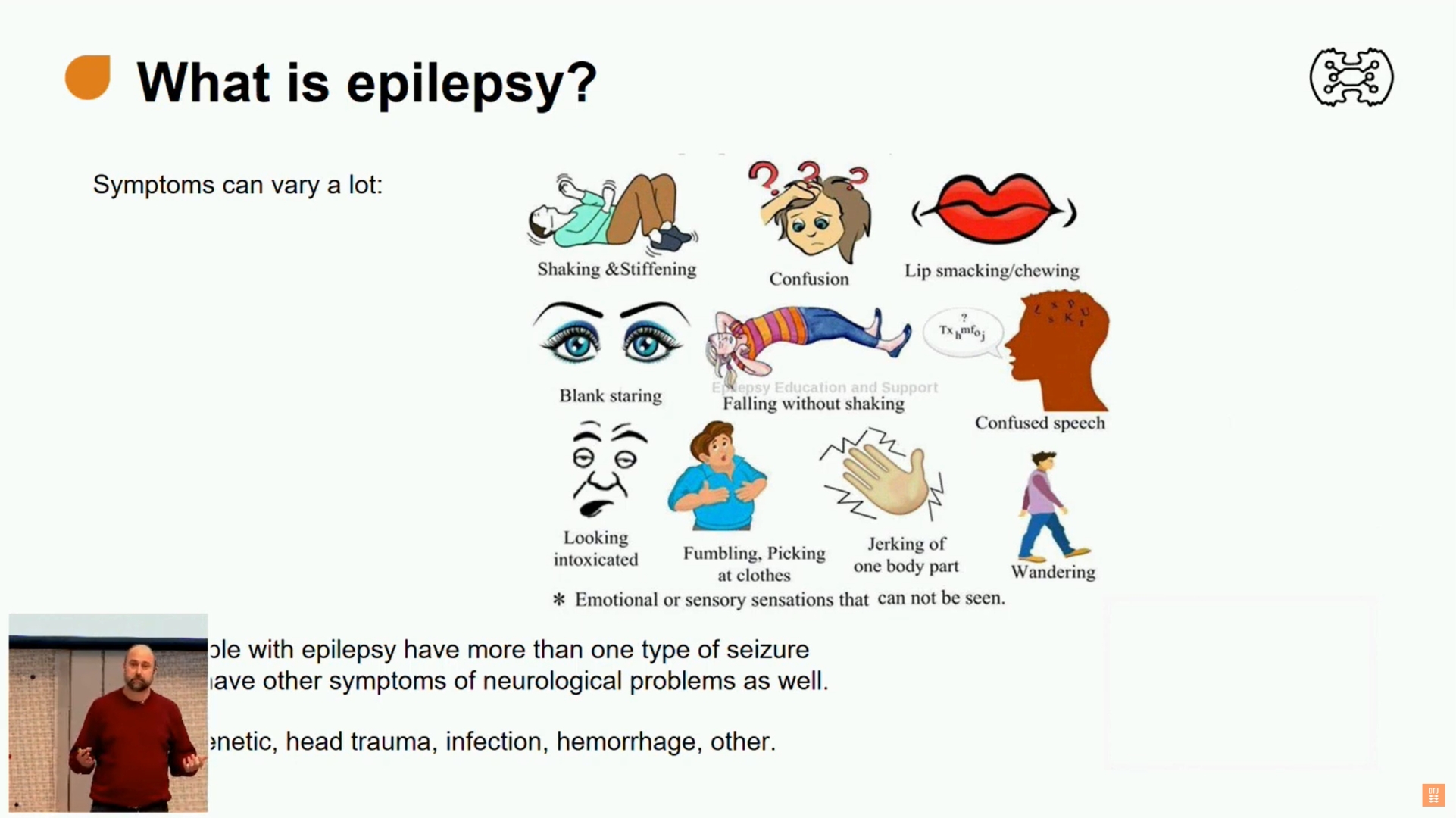
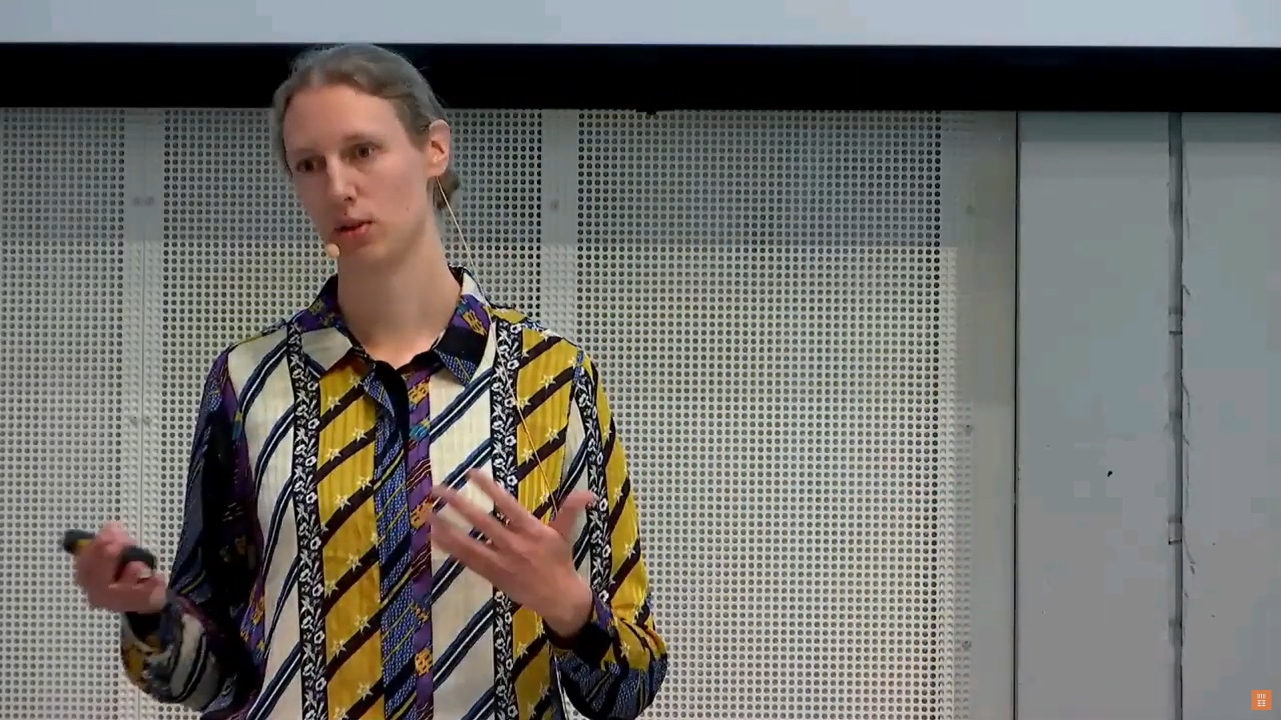
by Amesto
She is Lead Data Scientist at Amesto NextBridge Denmark. Previously, Laura applied data science in the water sector and supervised MSc students at DHI, did consulting at Teradata and researched non-specific effects of vaccines at the Danish SSI. Laura holds a PhD in machine learning from DTU.
by Amesto
During the COVID crisis, we applied Natural Language Processing techniques to aid the International Federation of Red Cross and Red Crescent automate their categorization of disaster response reports globally.
She is Managing Director at Amesto NextBridge. Former quant & startup entrepreneur, turned Data & AI nerd. Cand.Oecon from SDU, ML & AI from MIT, MSc. IT Management from ITU - writing thesis on AI. Guest speaker at ITU & MIT 2022, Make Data Smart, Genesis, Dansk IT.
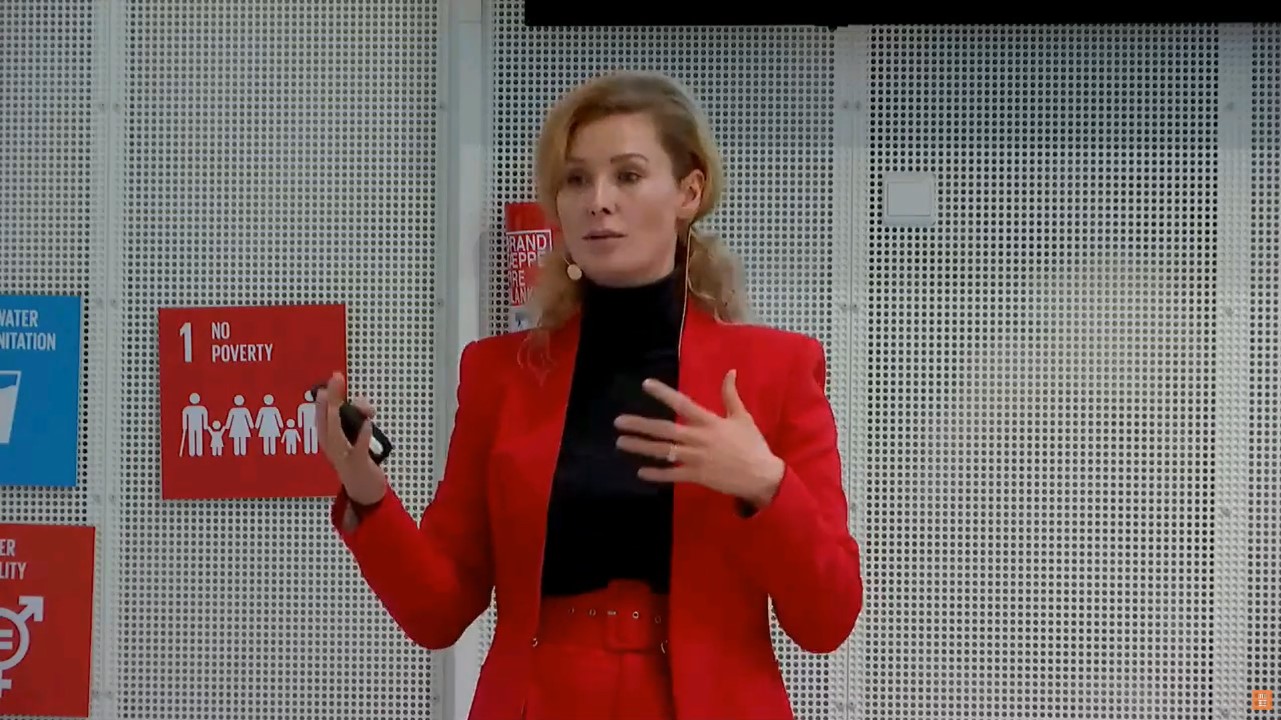
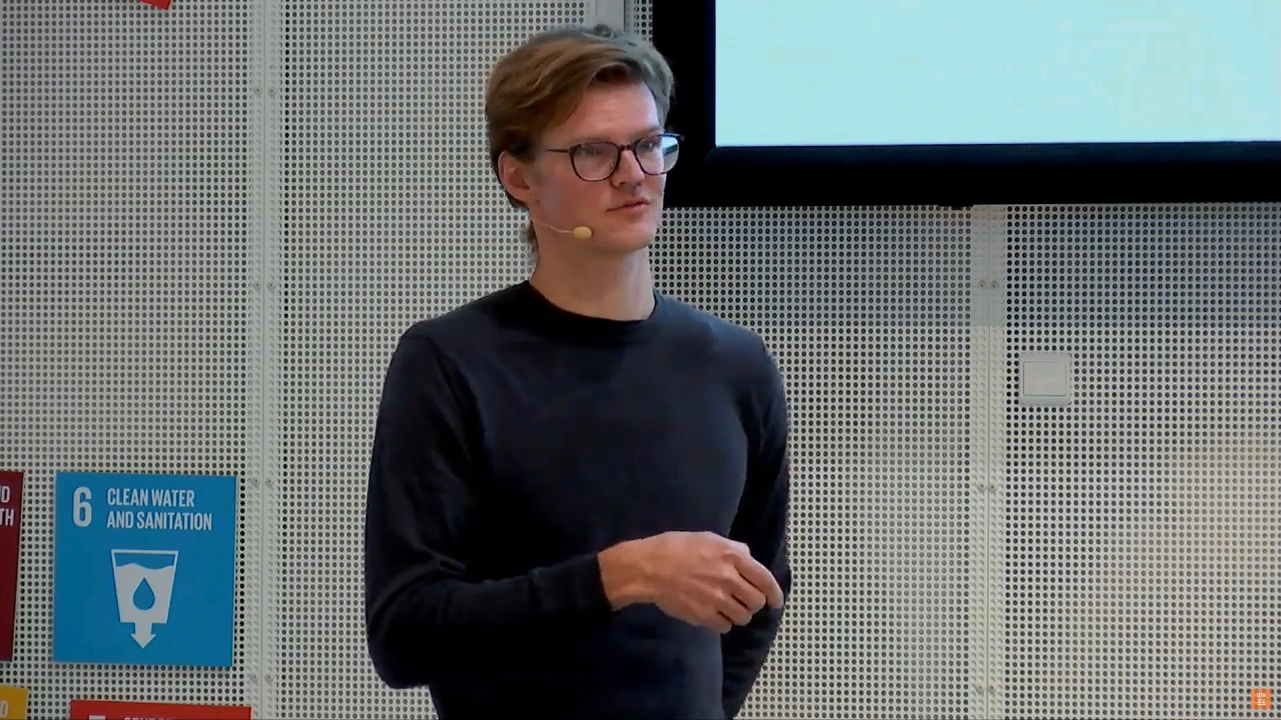
Non-Destructive Testing (NDT) for large critical structures, like wind turbines.
Development has gone a slow transformation based on the need of the industry. When the need to go places where we can send humans, like nuclear reactors, we solved it by automating the inspection and data collection. Automated data collection was a success, and the last 30 years data collection has been standard part of our services.
On the wave of new disrupting companies in the 2010s, our CTO asked the question: How could we disrupt our self? Big data, cloud storage and automated data evaluation was on the list. Since we have been working on improving the total inspection speed with rapid high-quality data and fast algorithm-based evaluation.
He is project manager in Digital Service at FORCE Technology, changing the way our customers work with data from their quality inspection. Working in the field of building automated mechanics solution that’s tailored to fit their product inspection and training AI models to become specialise in analysing the data for quality control.
How do we design a fantastic future? What are the practical applications of AI and how do we make it happen? Johan will talk about building AI products in the real world, the future we’re headed towards, and invite the audience for an open dialog.
He has spent the last 10 years in Silicon Valley designing advanced technology in fields such as AI, robotics, biotech, aerospace, and self-driving cars. Previously, he led the Autonomous Design team at Lyft and launched moonshots at Google X.
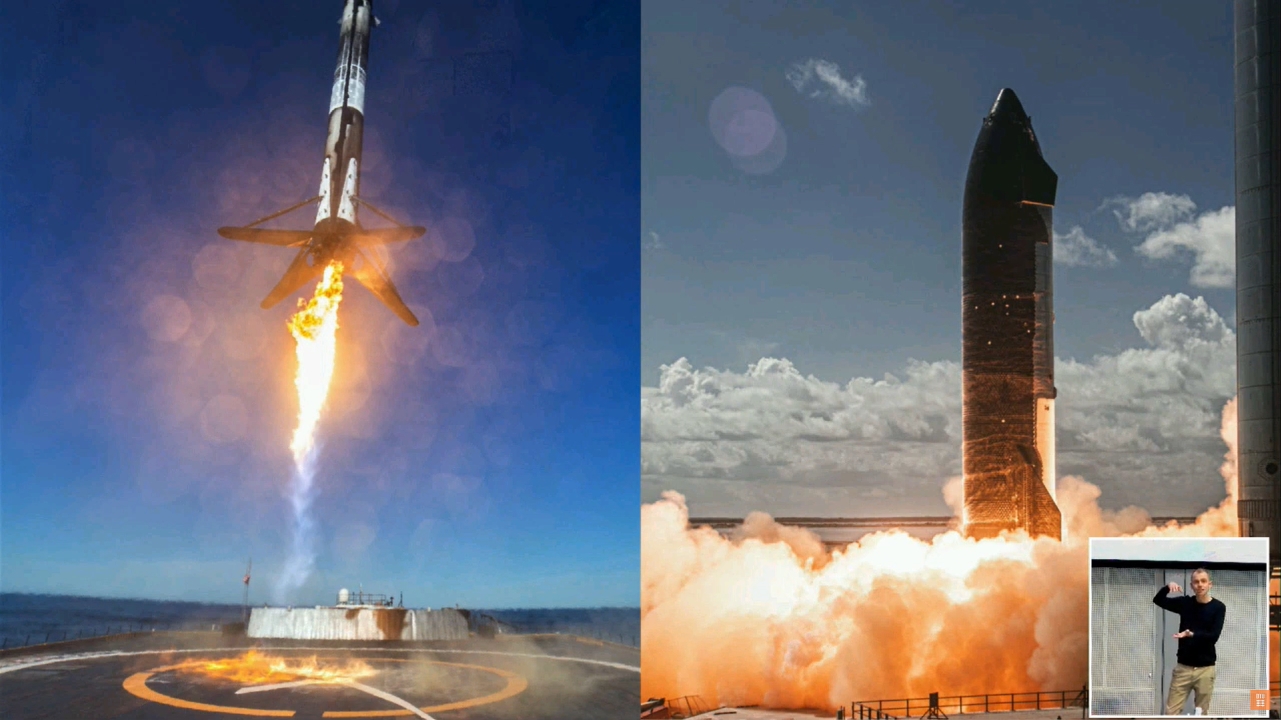
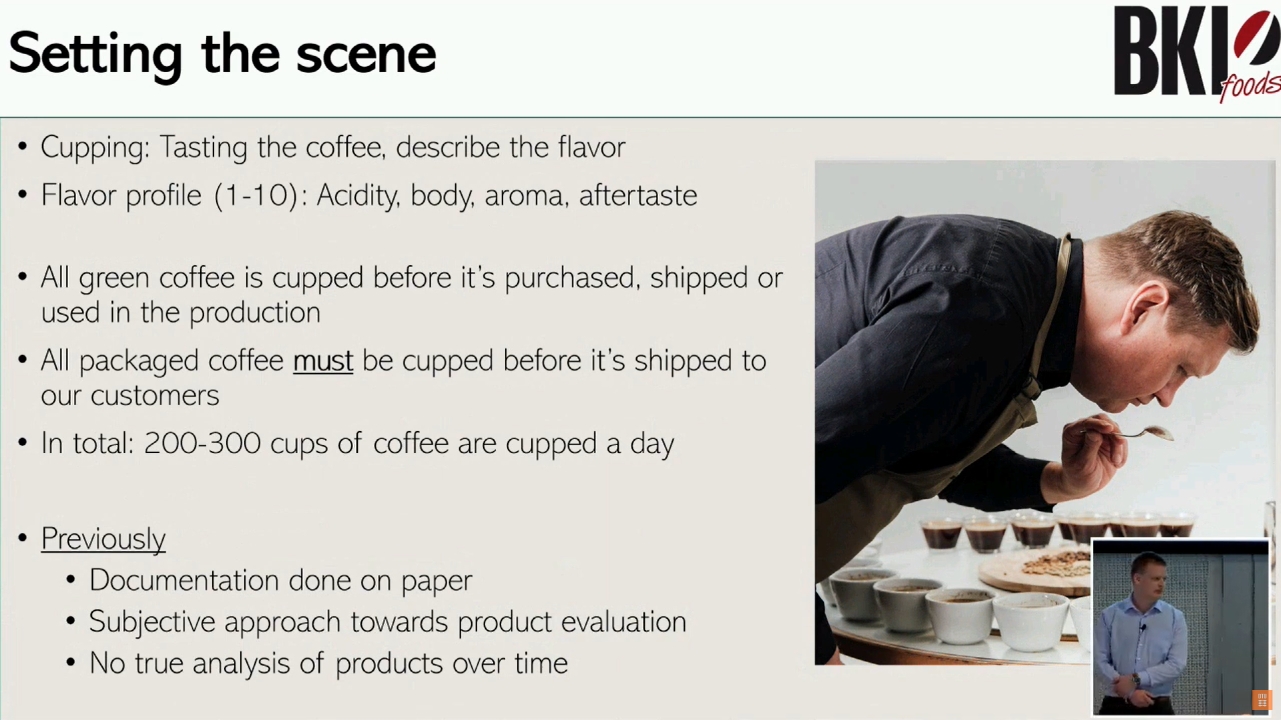
by BKI
Is it possible to use AI to predict how a cup of coffee will taste? BKI believes so. Nicholaj will be taking you through the journey BKI has been through building an AI product that can help create the right blend of coffee beans to create the required taste of a cup of coffee.
Nicholaj has spent the last 7 years at BKI building and implementing systems to digitize their production and create the foundation for advanced analytics. He has led projects related to data warehousing, digitization, and automation of processes and AI/Machine learning.
by Ambolt
In his talk Andreas will take you for a deep dive of how Applied AI can generate value today. He presents how Ambolt AI helps domain experts boost their efficiency with AI. Ambolt AI calls this Human-centric AI.
Co-founder of Ambolt AI has a background in Computer Science, and is on a mission to empower people with AI. At Ambolt AI we don’t believe AI will replace people, but we do believe people, who use AI will replace people who don’t.
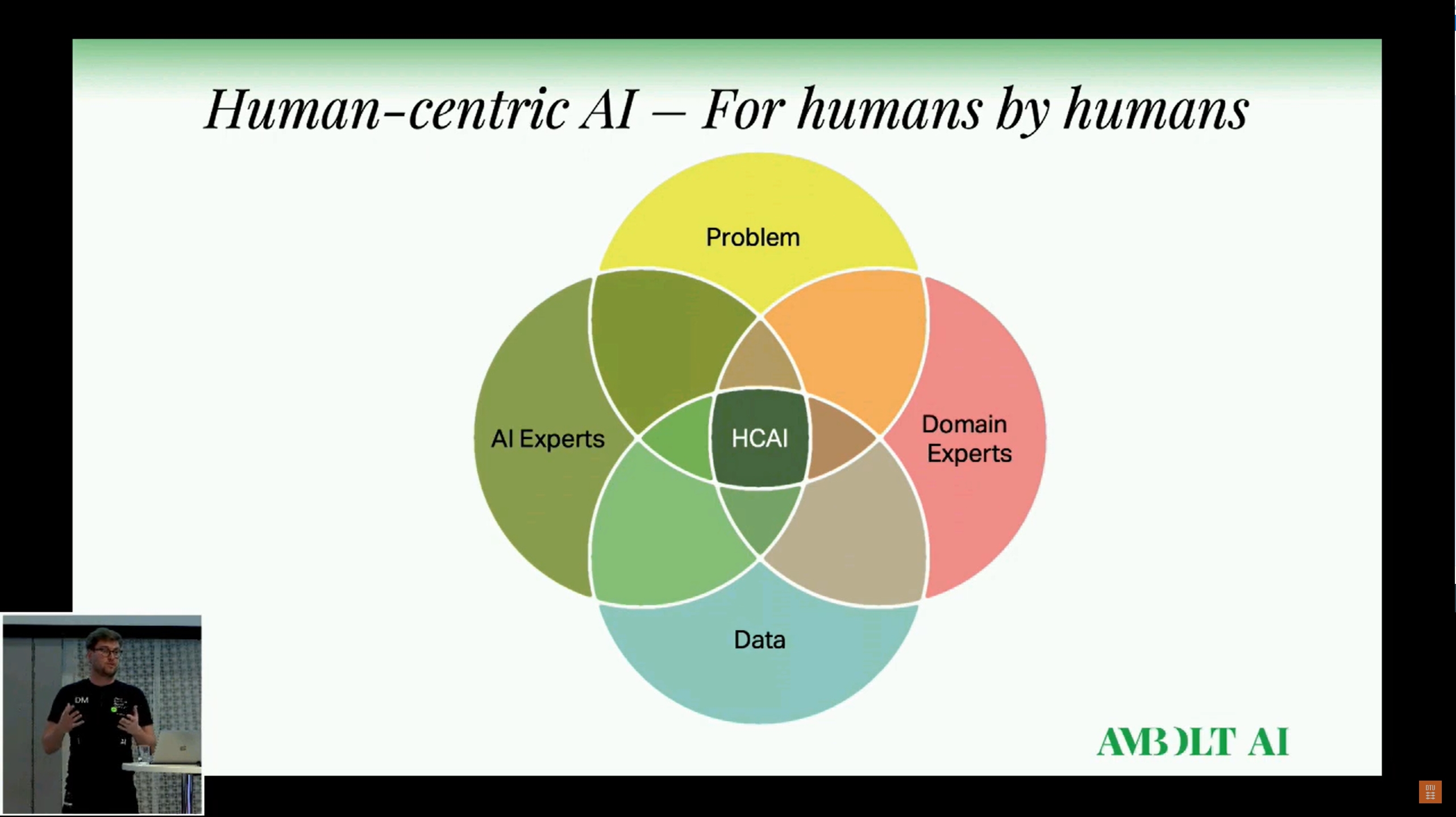
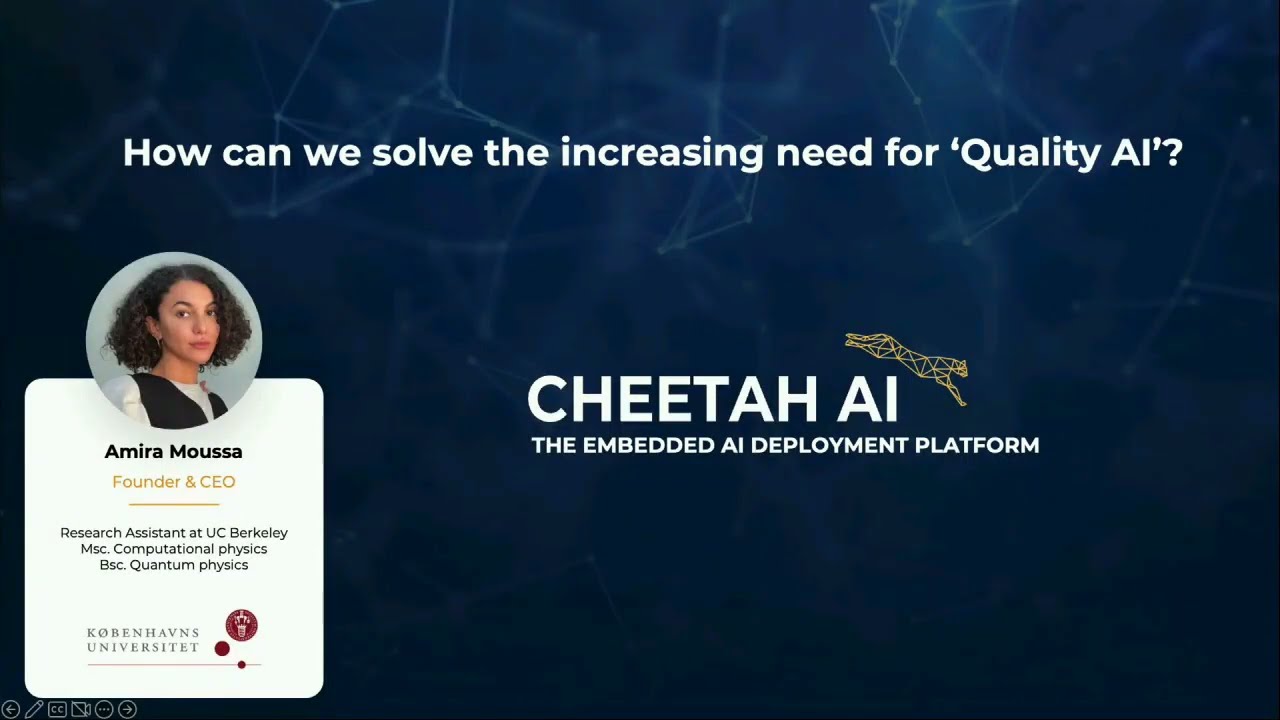
by Amira Moussa from Cheetah AI
The demand for faster, more robust, and more energy-efficient AI has increased exponentially in the last few years while the development cycle has been stuck. Can the FPGA chip solve this issue?
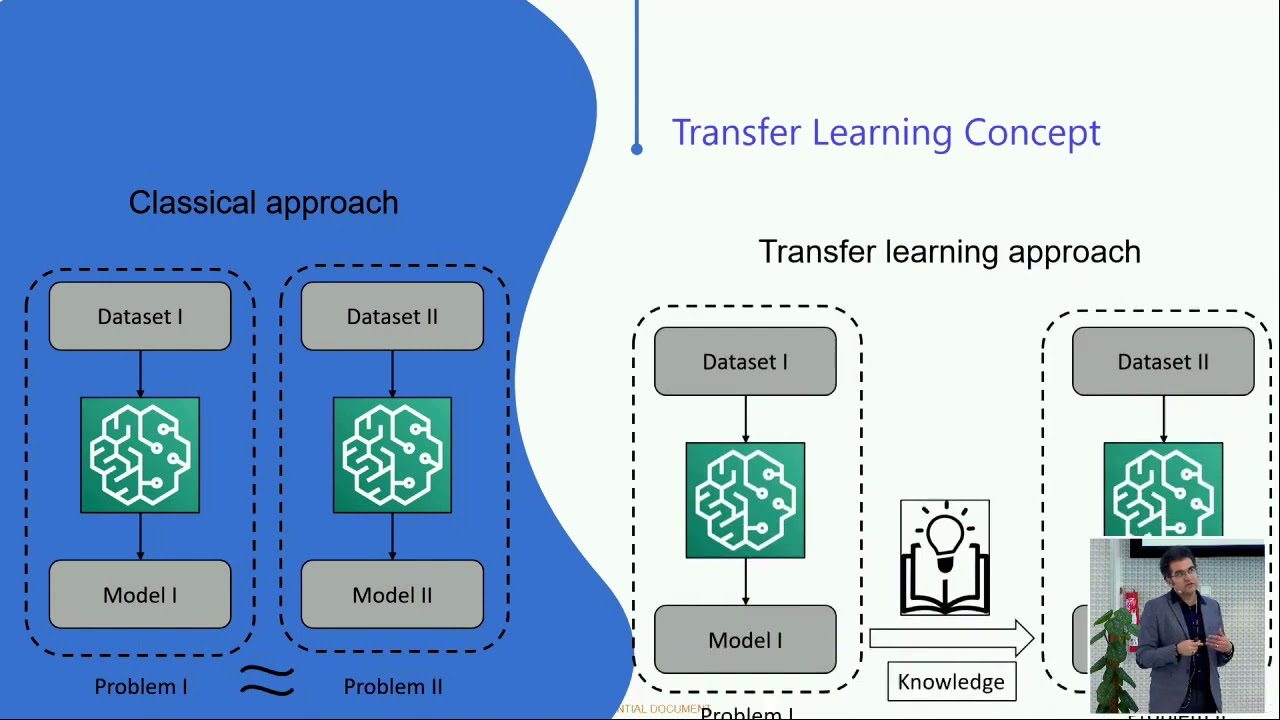
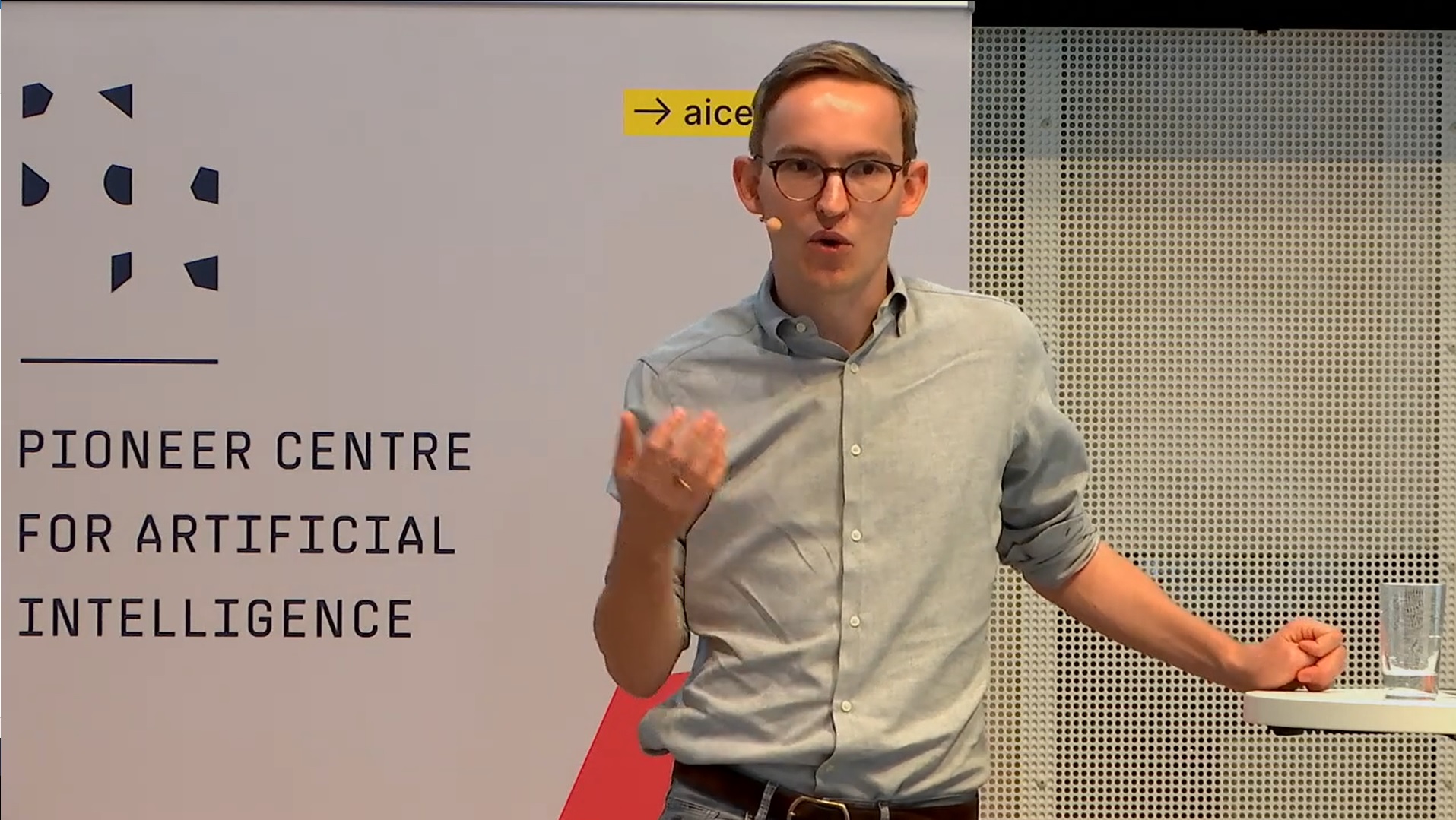
by Corti
In healthcare, the ultimate goal is to improve patient outcomes. In this talk, we’ll examine how Corti’s innovative technology is transforming the way healthcare providers assess and treat patients. We’ll explore real-world case studies from Corti as well as the future of AI technologies in healthcare.
Henrik Cullen is the VP of Product at Corti AI. He has led the development of most of the product and enjoys working closely with customers to improve the experience for healthcare professionals and patients. Henrik is committed to continuing to develop innovative AI solutions that make a real difference in the lives of patients and healthcare providers.
by UCPH
The forthcoming AI Act challenges existing legislative paradigms, emphasizing self-criticism and multidisciplinary collaboration. This talk explores those new compliance requirements for multidisciplinarity, and looks at how we can create better collaboration models between lawyers and engineers.
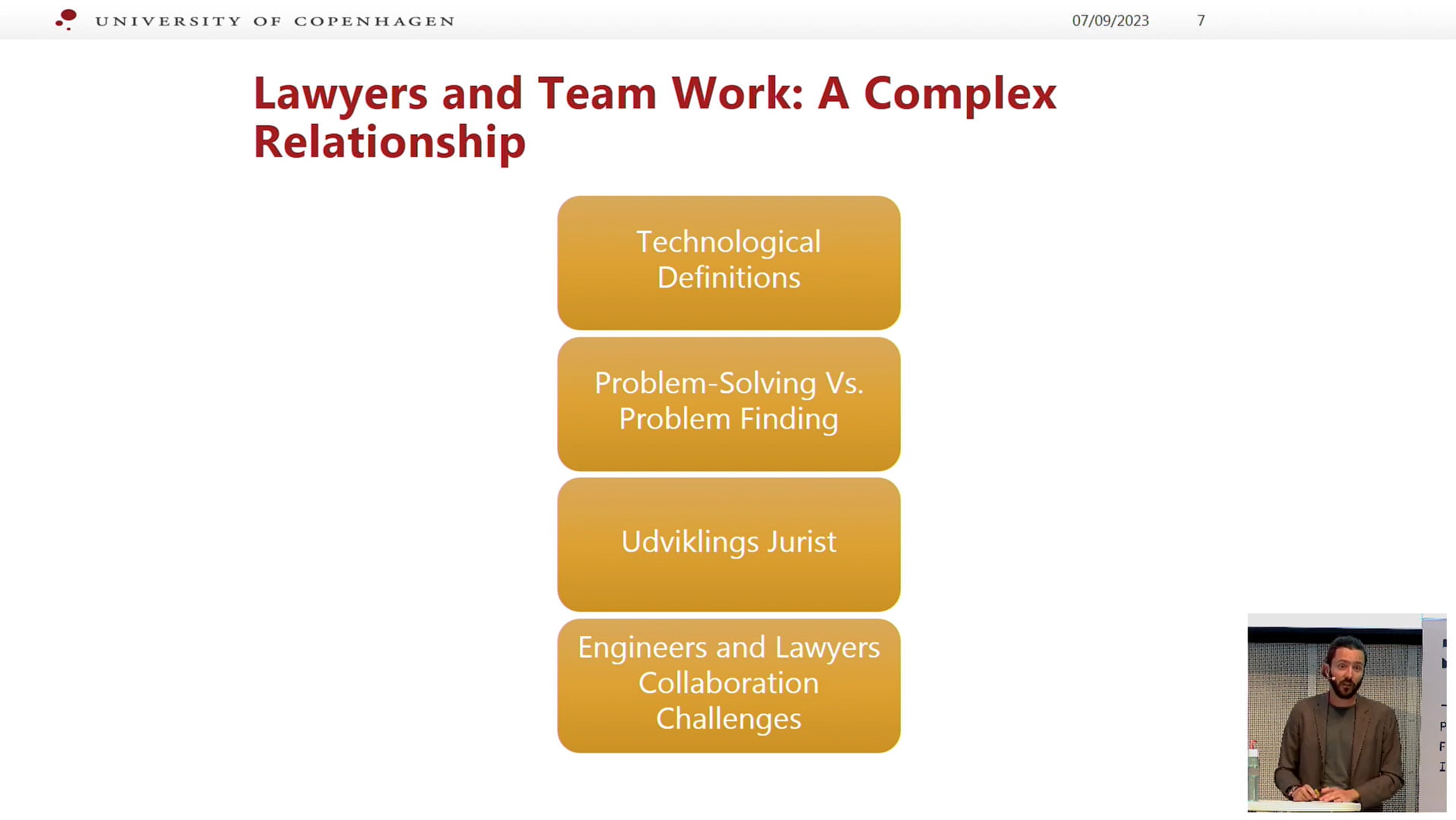
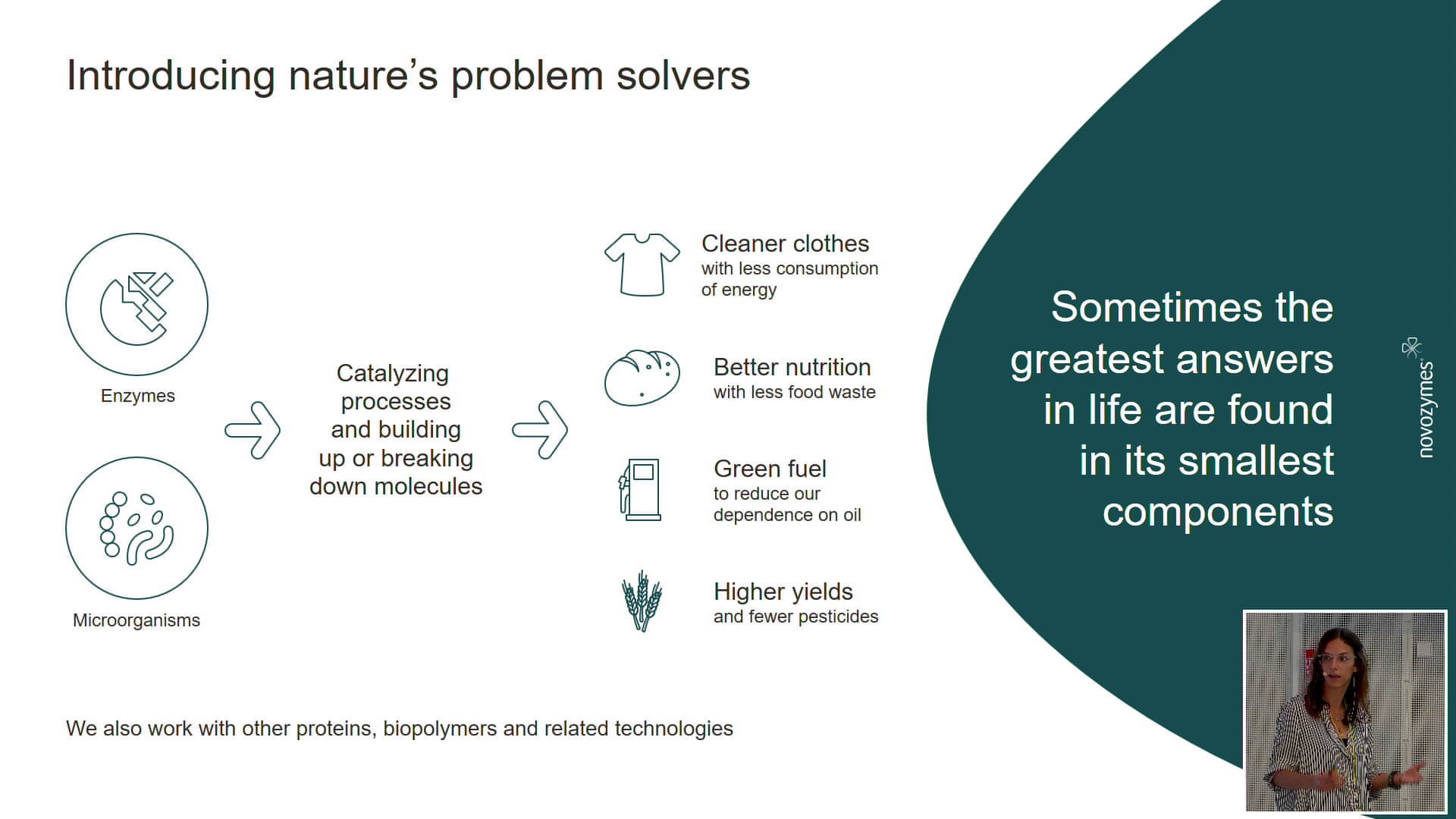
by Novozymes
This talk will introduce three Novozymes applied AI use-cases, as well as the motivations behind, executions and considerations taken. We will also discuss how the recent surge in LLMs (e.g., ChatGPT) has affected the company, and what factors to recognize when incorporating such models in the day-to-day of business.
Victoria is a Data Engineer in Advanced Analytics at Novozymes. She works with sourcing and processing data for data-driven projects as well as maintaining compliance and establishing guidelines for the use of AI in Novozymes. Victoria values keeping up to date with new technologies while still possessing a critical outlook on which of these can truly surpass the hype and create value.
Peter graduated from DTU as M.Sc. in Mathematical Modelling and Computation in early 2022. With a specialization in machine learning, he is now an Industrial PhD student at Novozymes and the University of Copenhagen. His research is focused on machine learning-driven enzyme engineering.
by ROCKWOOL
As we navigate the fourth industrial revolution, the integration of artificial intelligence and machine learning has revolutionized how we optimize production, enhance quality control, and streamline operations. Join us for a talk where Shabab, Senior Data Scientist at ROCKWOOL A/S, will discuss and explore the challenges and opportunities surrounding the implementation of AI and ML solutions, shedding light on the ease and complexities involved in reshaping the future of manufacturing.
Shabab has a background in Computer Science and over 5 years of experience working at the intersection of technology and business. He combines his deep technical expertise and ability to easily and effectively communicate complex technical terms to deliver end-to-end solutions. In his career so far, he has been responsible for both managing and developing AI/ML solutions that transformed business processes in multiple industries.
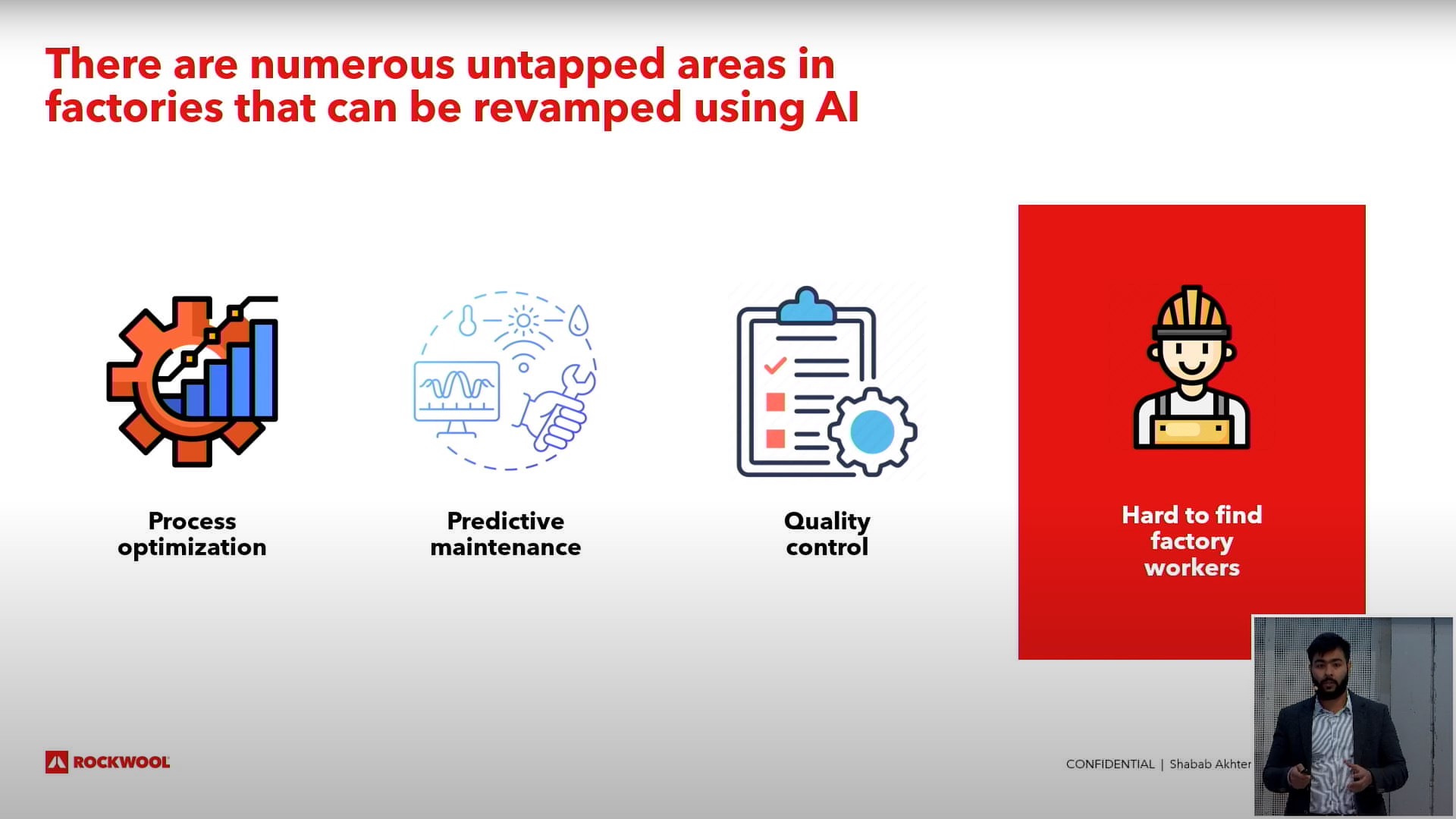
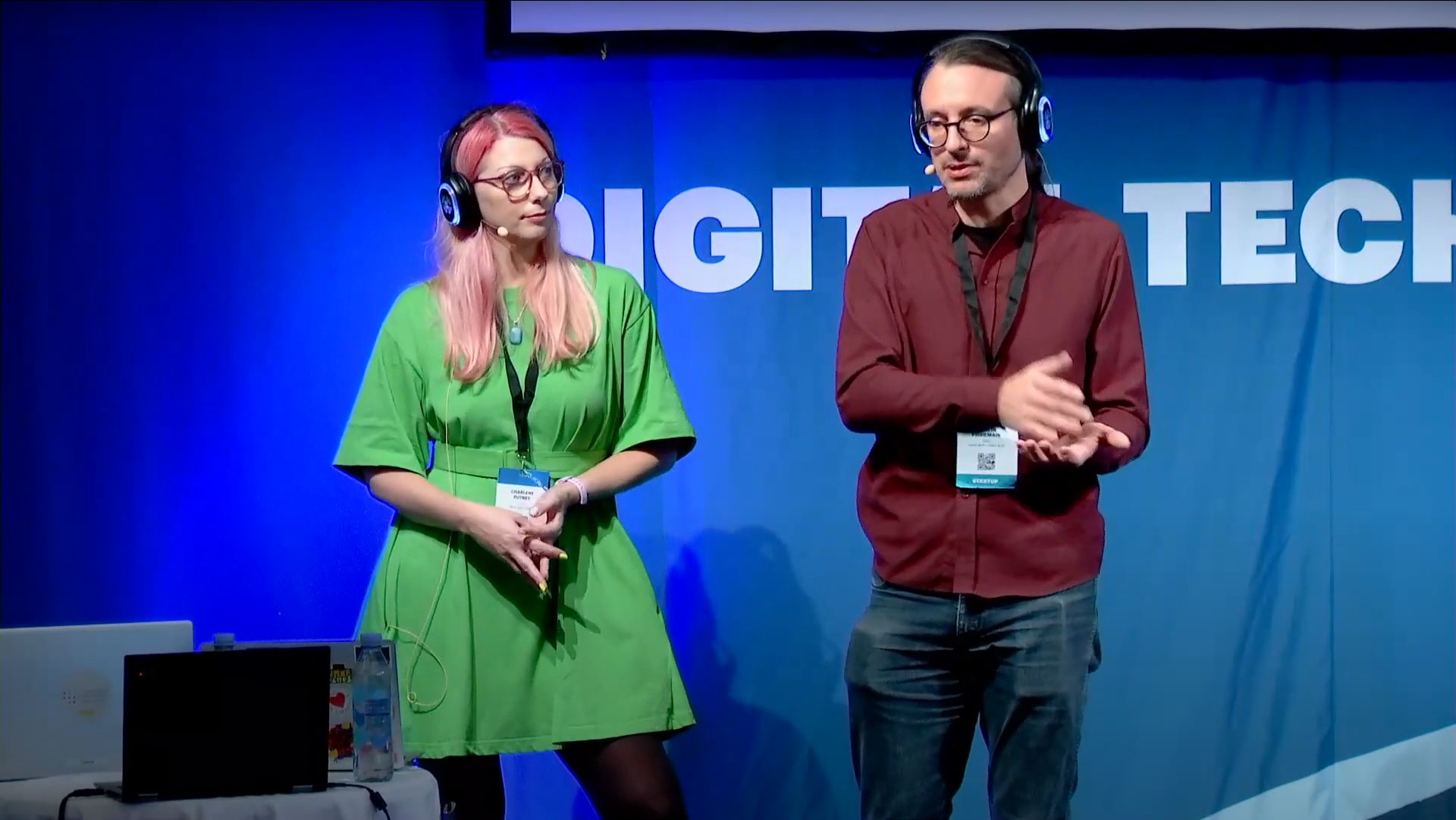
by LAIKA
LAIKA's founders believe that the next stage of AI will focus on the personal: crafting unique experiences for each individual user. They've been exploring this for the last year with a personalised creativity tool for writers, and are now set to pivot to crafting a full-fledged "writers room" with AI. In this talk, they'll share wisdom from their journey so far, including 3 specific actions startups can take to personalise their AI offerings.
Charlene Putney is an award-winning writer and teacher from Ireland. After working at Google and Facebook in management positions, she's been writing for videogames since 2013, including writing for Divinity: Original Sin 2 and Baldur's Gate 3.
Dr Martin Pichlmair is Associate Professor at the Creative AI Lab in ITU, and a veteran entrepreneur with several games studios under his belt including the multi-award-winning Broken Rules.
by Focalx
In this talk, we'll dive into how focalx harnesses traditional AI, specifically computer vision, as a foundational pillar of its business model. We'll explore the challenges posed by data scarcity in training ML models and unveil the innovative solutions we've adopted. Discover how, by employing generative AI and other cutting-edge techniques, focalx creates synthetic data to bridge the gap, ensuring more accurate and reliable vehicle inspections.
Isabella, once a pro dancer, has since delved into the world of Autotech entrepreneurship. Her experiences span Strategy & Implementation Consultancy and are further enriched by her Master studies in Finance & Strategy. She founded focalx, a B2B SaaS startup disrupting vehicle inspection and handovers using AI.
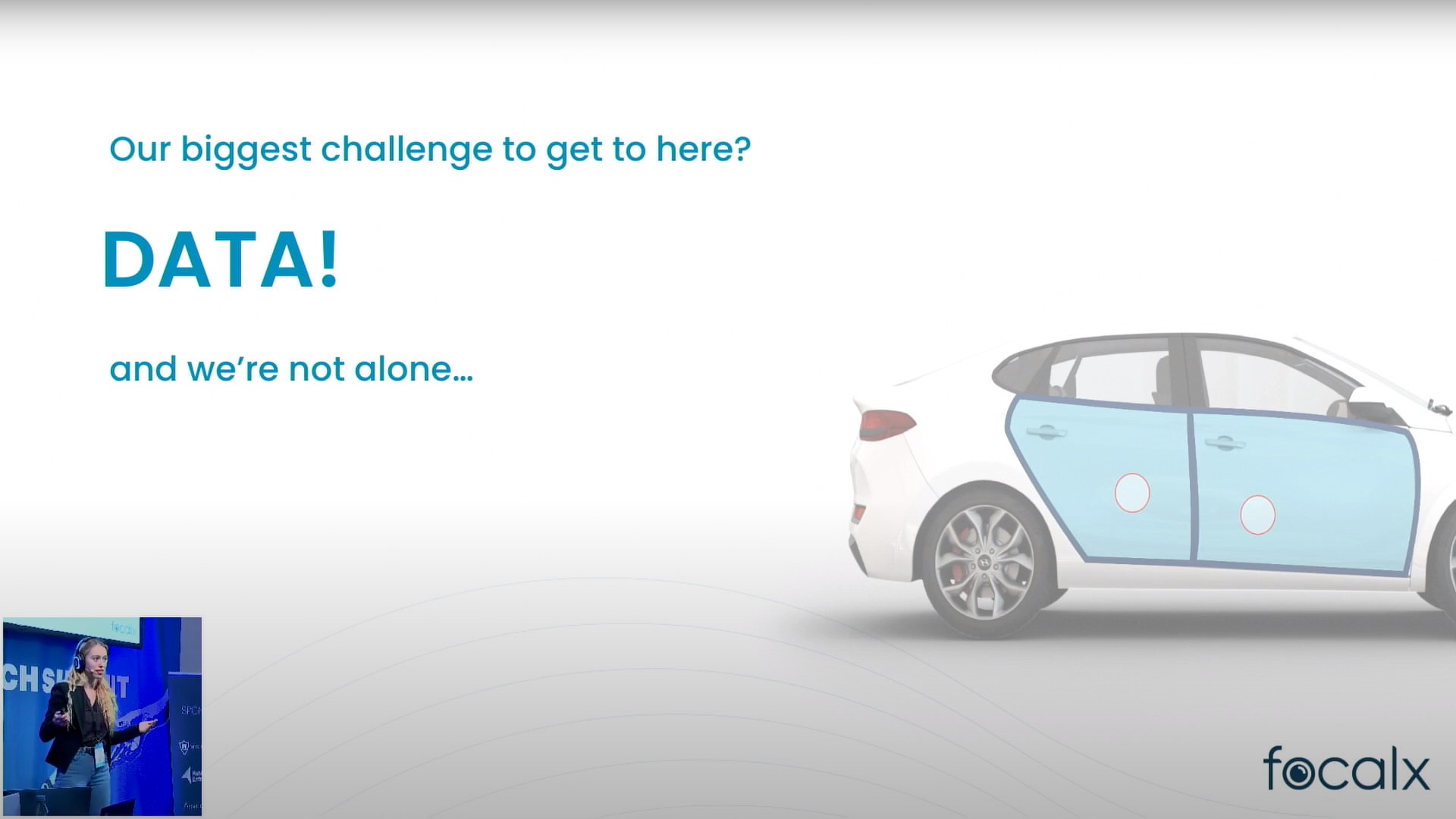
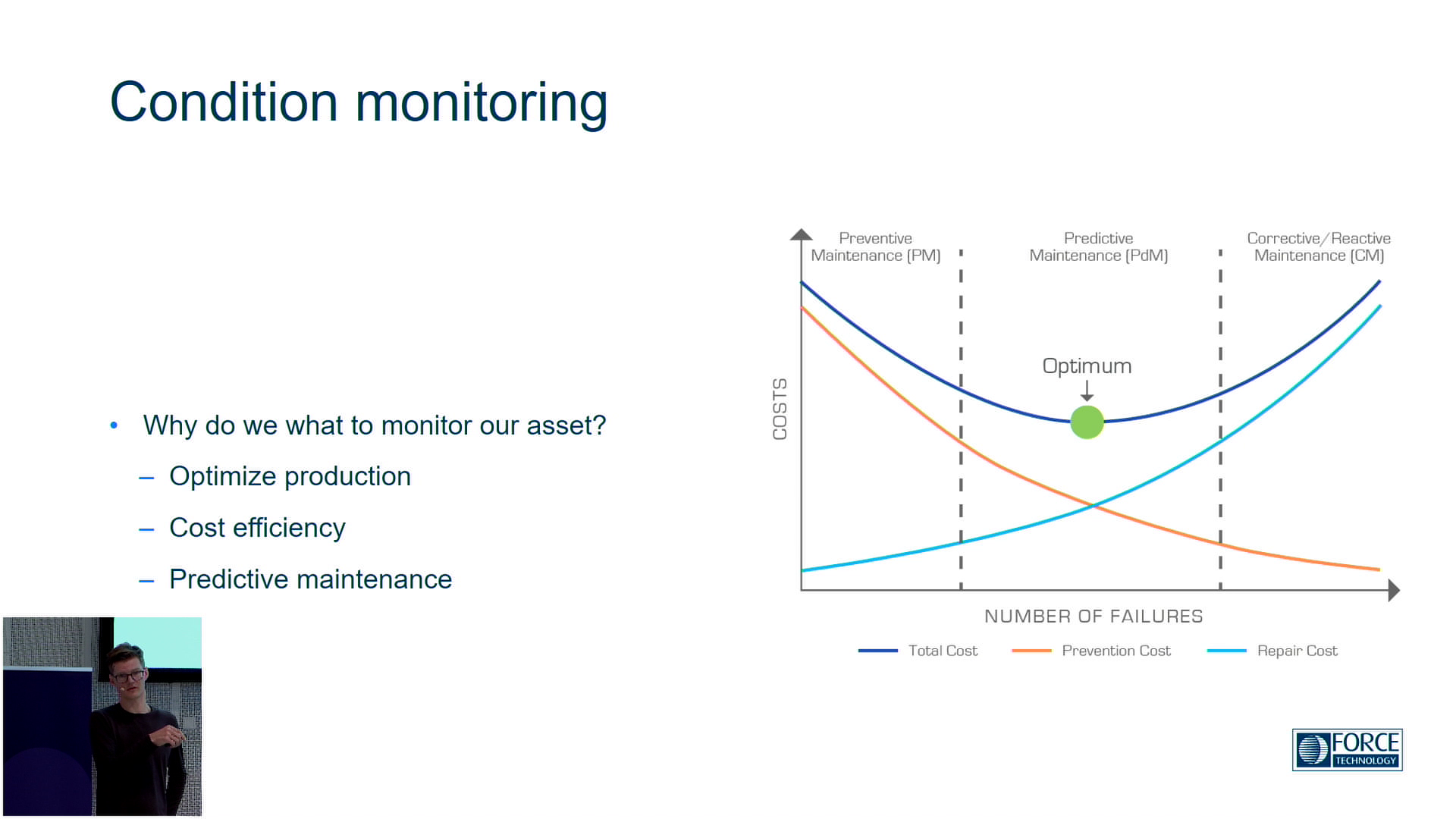
At FORCE Technology we are investigation how to improve hybrid testing, by using machine learning as an approach to address the complex challenges in condition monitoring. We are integrating advanced neural network techniques with an understanding of the underlying physical principles, this cutting-edge methodology offers a powerful solution to efficiently analyze and predict the behavior of assets.
EU is investing heavily in addressing the gap between European and international capabilities in AI. One aspect is the ability to test AI before entry to market and DTU is coordinating the one for Smart Cities and Communities AI and robotics domain, known as CitCom.ai.
The purpose of CitCom is to accelerate new AI and Robotics innovations to the market and will offer support especially for SMEs and their cutting-edge solutions and provide test that can serve to get the first difficult customer.
Rasmus Reeh is project lead of CitCom.ai and deputy at Connecting Communities at DTU Compute Dynsys. An economist by training he has worked more than 10 years within different roles in the Smart City domain, including DTU Elektro and latest as Development Lead of Copenhagen Solutions Lab.
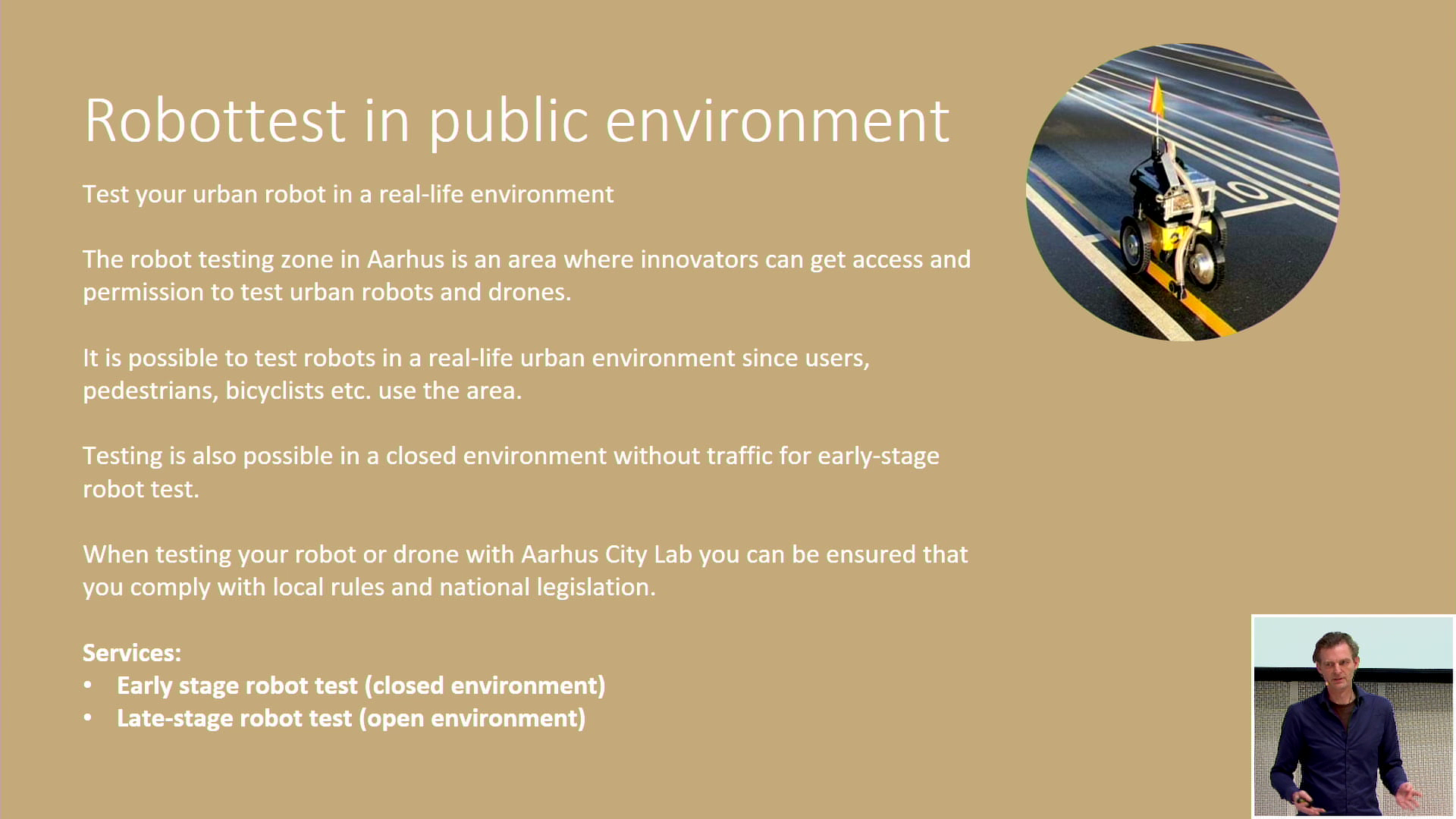
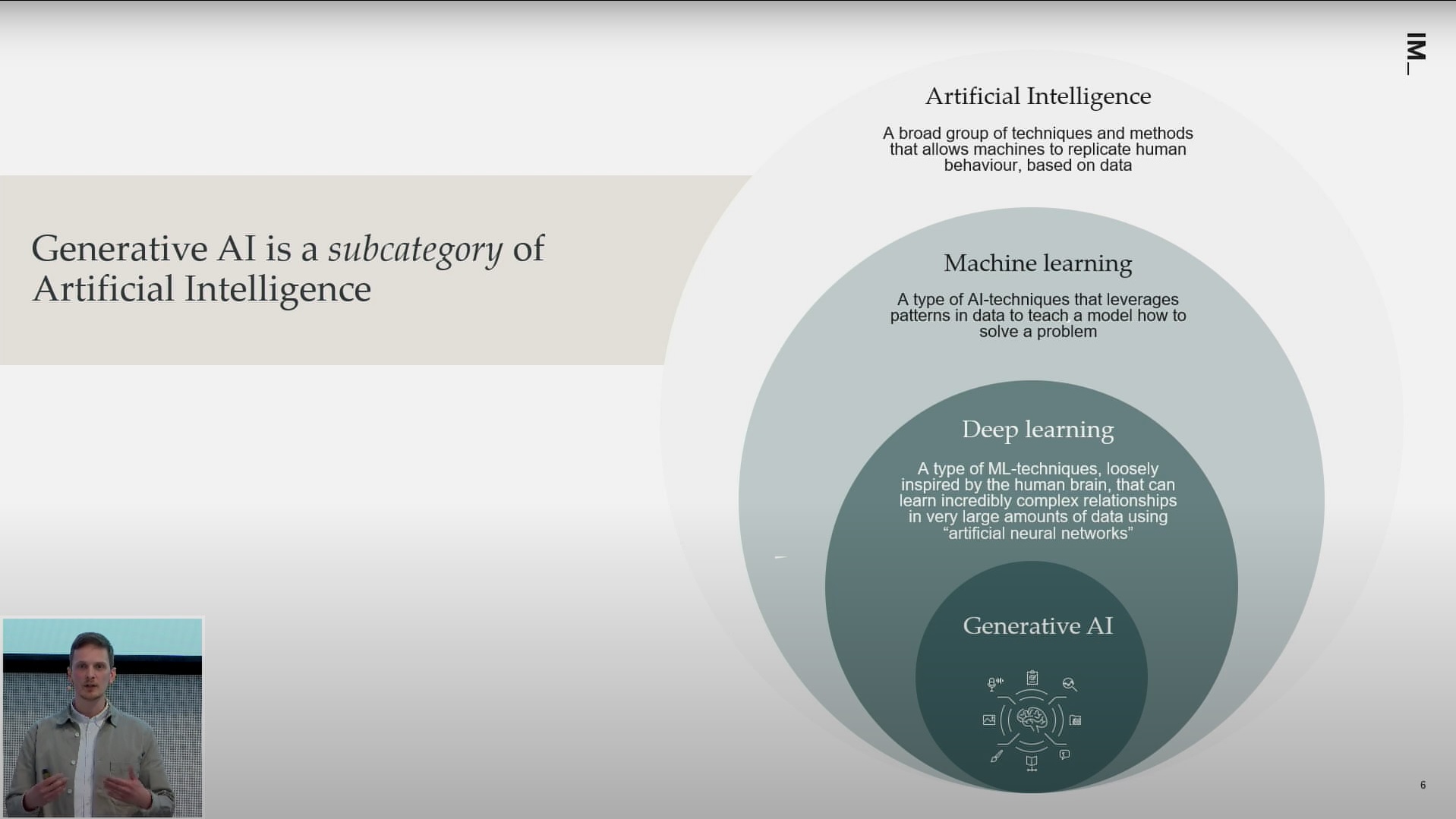
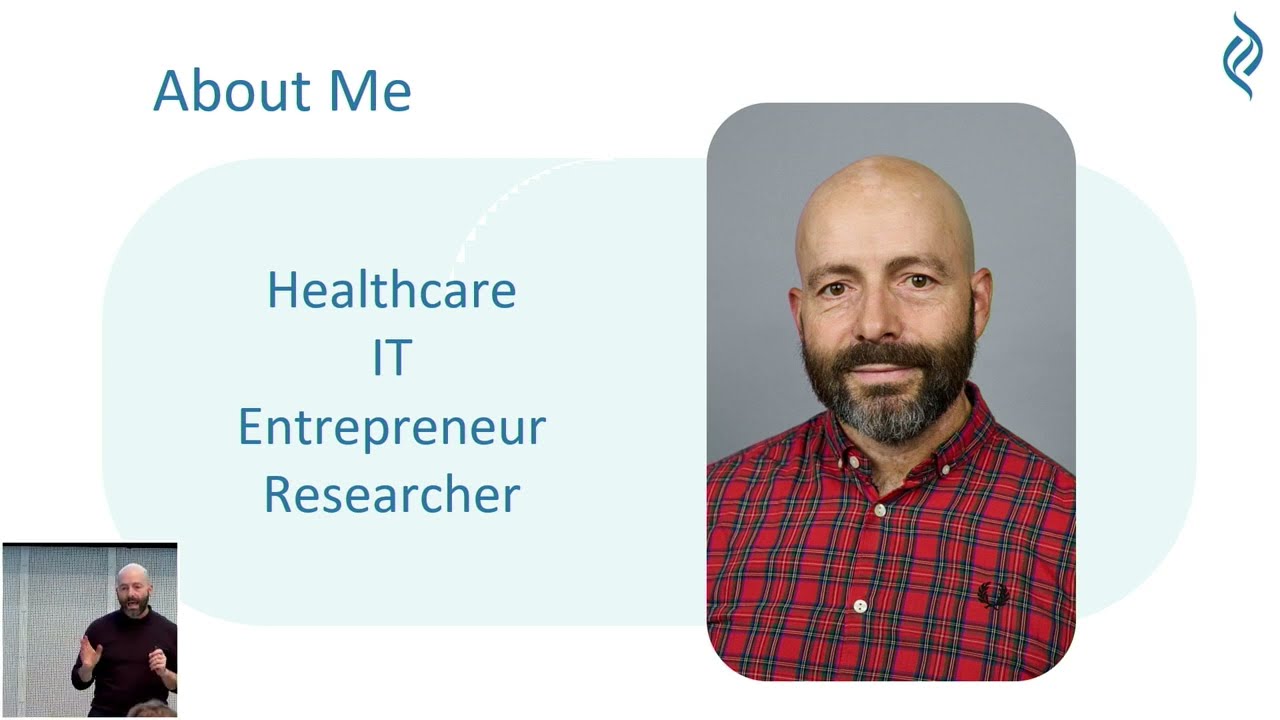
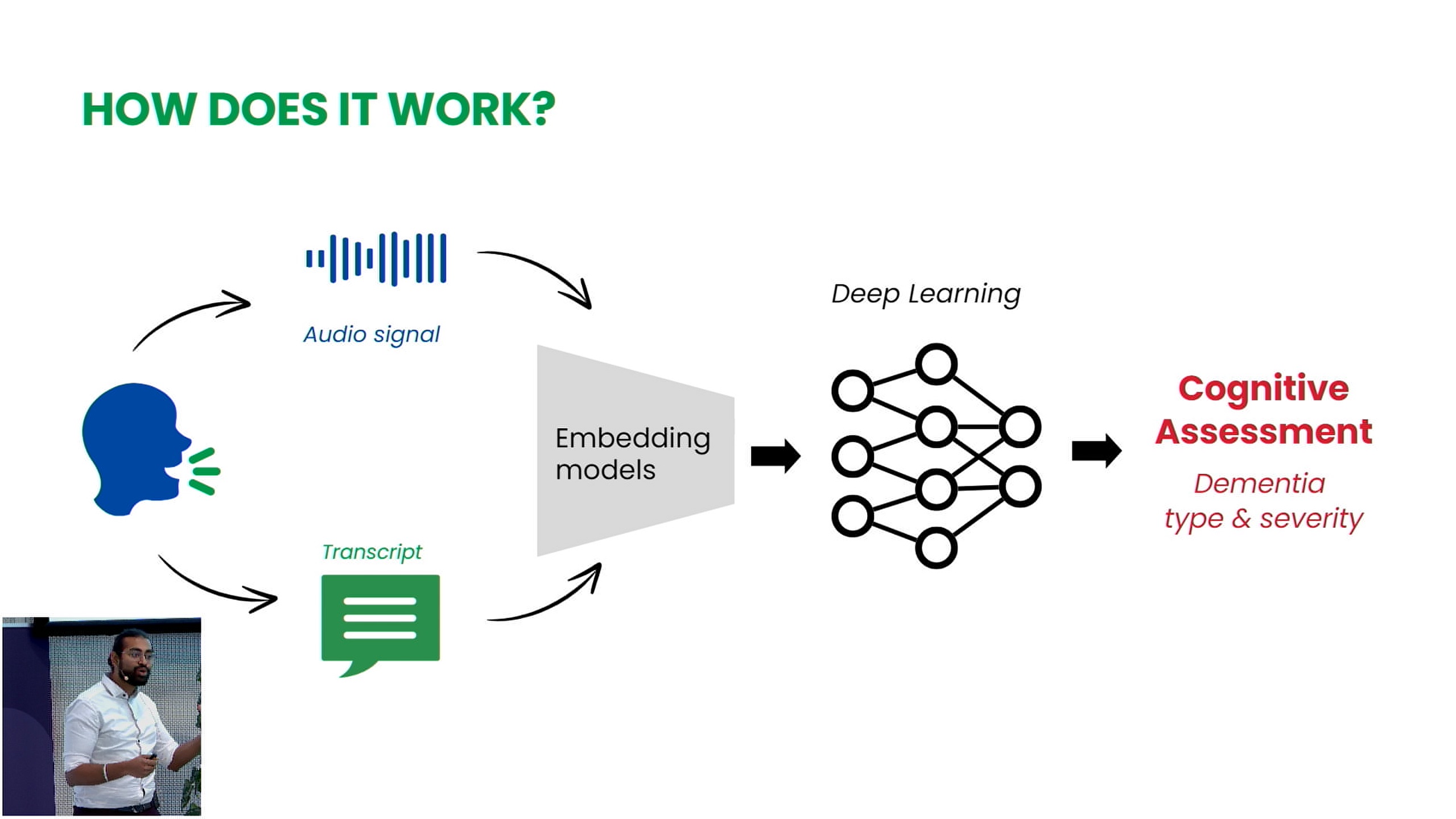
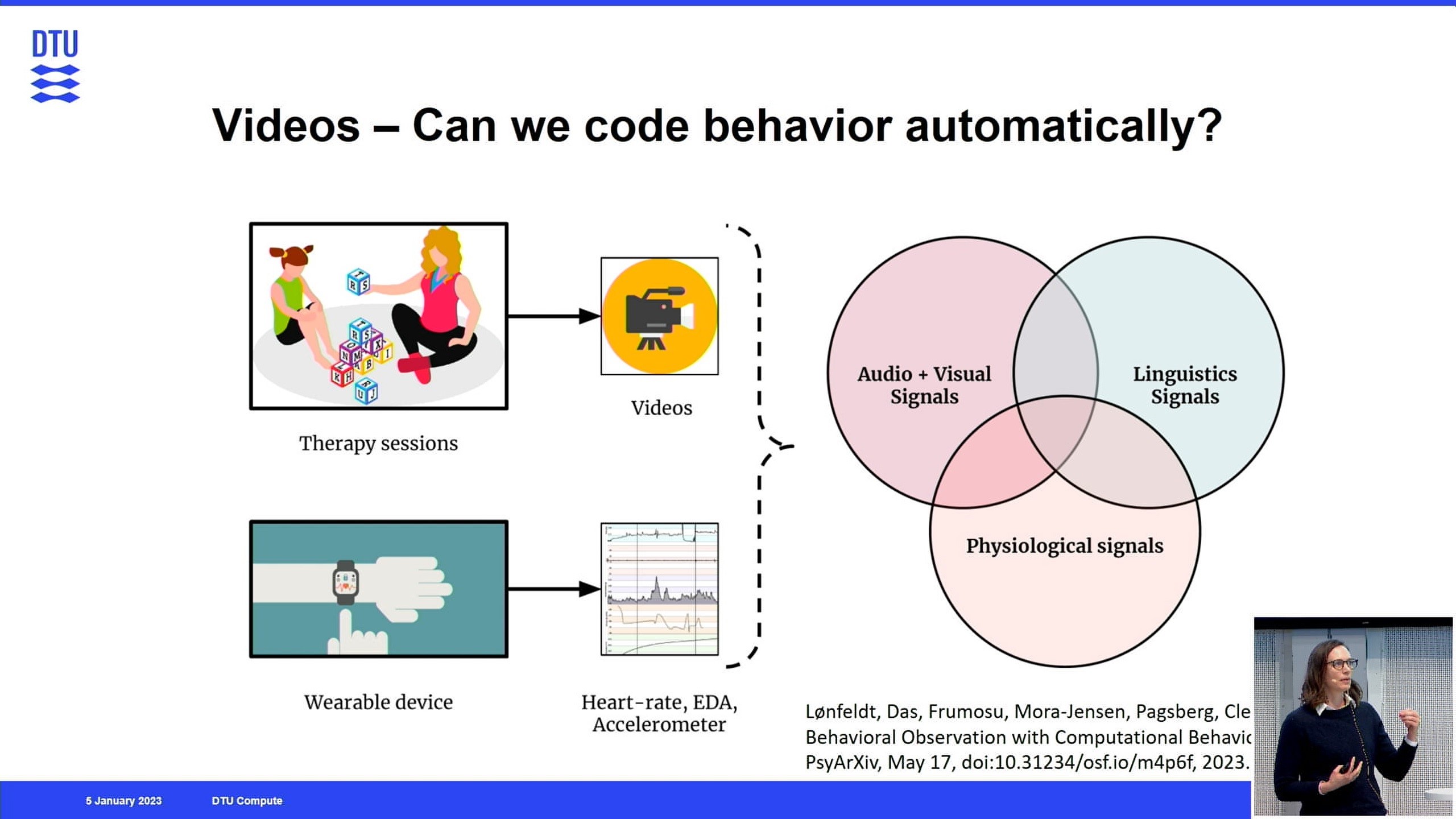

Assisting Marine Biodiversity Assessments Using Computer Vision and Smart KPI’s
It is no secret that we are currently in a major biodiversity crisis- especially at sea. Pollution, rising temperatures, and bottom trawling have negatively impacted critical parts of our marine ecosystems. Luckily, companies and governments are determined to invest in major restoration plans. However, how do we track if these initiatives have the desired impact, and can we utilize current AI technology in doing so?
Speakers:
Maria Bakali, Co-founder and CBO of Anemo Robotics, Mechanical Engineering Student at DTU
Co-founder of Anemo Robotics. M.Eng. in mechanical engineering and currently pursuing an M.Sc. in industrial engineering and management. Highly interested in sustainability, nature. In Anemo Robotics, she is involved with financial management and business development.
Simon Madsen, Co-founder and CTO of Anemo Robotics, Data Science & Entrepreneurship MSc. Student at DTU
Co-founder of Anemo Robotics. Wearer of many hats, but mainly focused on computer vision, cloud infrastructure, and general Data Science
Solving Society's Greatest Challenges
Research should have a large and diverse readership. But we live in a world where the most brilliant minds have the smallest audience. Proem is a new digital commons for research. The platform provides a streamlined and efficient reading experience with access to the very latest research preprints. We leverage both open source and proprietary AI models to summarize, explain, and interrogate research papers, recommend related papers, and facilitate discussions in a public forum, with the goal to connect people around the process of discovery, innovation, and knowledge creation.
Speaker: Mads Rydahl, Co-founder at CPO at Proemial.ai
Rydahl has built computer games, recommender systems, and search experiences. He was the original Director of Product and Design at Siri, and founded UNSILO, a trendsetting AI solution for Scientific Publishers, acquired by Cactus in 2022. Rydahl is cofounder of Proem.ai, a new social platform for scientific content, which uses AI to facilitate discovery and moderate public discussions.


AI and tech ethics - Why you should build socially sustainable products and services.
In this talk, Tess will introduce some of the most foundational frameworks for considering Ethics, Representation, and Social Sustainability as they relate to technology and ML/AI. The talk will leverage her substantial experience from a career that has taken her from Social Sustainability work, through academia, to leading the development of Product Ethics for a Fortune 50 Conglomerate.
Tess Skadegård Thorsen, PhD (she/her), is a researcher, educator, and consultant specialising in representation in tech and media. With a background in ESG/CSR consulting, Tess has shaped her career around building socially sustainable products. She is particularly concerned with representativeness and bias in the development of technology.
Tess was awarded the 2022 Kraka Award for Danish gender research. Her research has been published internationally, and she has lectured across the world (Columbia University, Pennsylvania State University, Roskilde University, Aalborg University, Lund University, Copenhagen University, etc.).
Tess was a summer fellow at the NYU Institute for Public Interest Technology, and has previously worked as the Director of Product Ethics at Comcast NBCUniversal. She serves as an advisory board member to the Danish Pioneer Centre for AI and as a board member to multiple other organisations.
Camilla Nørgaard Jensen Programme Manager Mobile: +45 20828109 camjen@dtu.dk